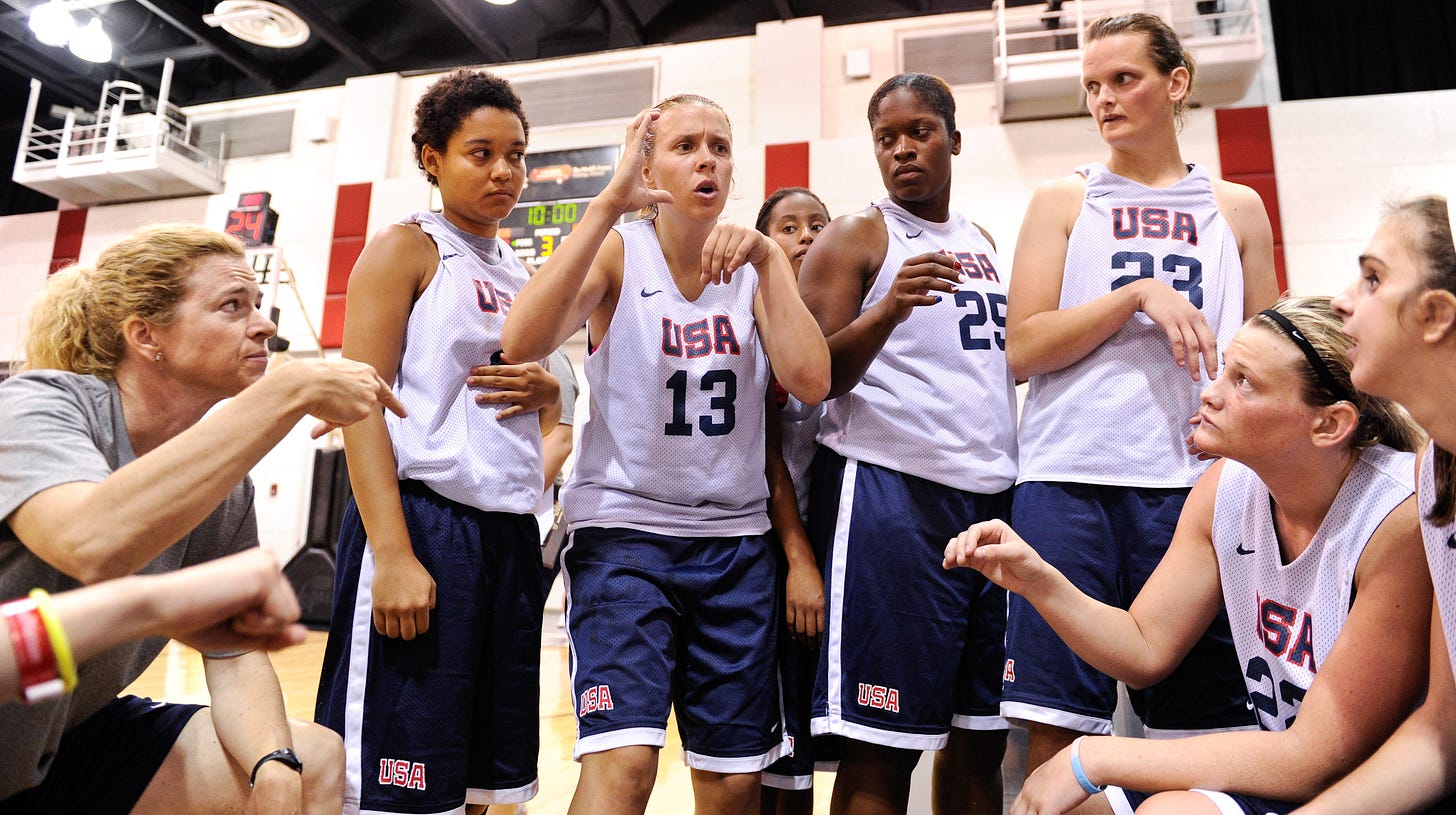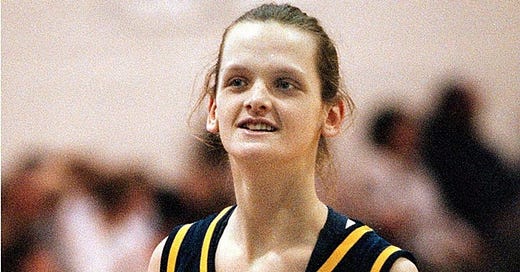Iowa’s Caitlin Clark’s playing basketball thrills television viewers and spectators in the arenas.
Her duel with LSU’s Angel Reese made Monday’s game the most-watched women’s college basketball game on record. ESPN states that this game averaged 12.3 million viewers and peaked at 16 million viewers.
It could motivate a younger generation of players to participate in any sports sooner.
Suddenly, I got bothered by the following publications:
Silly! What about our forgotten Deaflympians?
We need more media coverage about our participation in the Deaflympics, the oldest multi-sport event after the Olympic Games (1924.)
For example, have the United States Olympic and Paralympic Committee (USOPC) executives and the Commissioners of the Commission on the State of U.S. Olympics and Paralympics (CSUSOP) heard of Ronda Jo Miller Donatucci?
In the celebration of Women’s History Month 2024, the Gallaudet University Alumni Association (GUAA) released a statement on March 31:
Q: How many Gallaudet student athletes have been inducted into the Gallaudet University Athletics Hall of Fame not once, but twice?
Q: How many Gallaudet student athletes have had their jersey numbers retired not once, but twice?
Q: How many Gallaudet student athletes have had tournaments named in their honor?
The answer to all three questions is one – and the student athlete is Ronda Jo Miller Donatucci, ’02. GUAA is proud to honor her during Women’s History Month 2024.
Ronda Jo, from Minnesota and the Minnesota State Academy for the Deaf, was inducted into the Gallaudet Athletics Hall of Fame for women's basketball in 2008 and women's volleyball in 2014.
She was a three-time Women’s Basketball Coaches Association (WBCA) All-American first team selection and three-time Capital Athletic Conference (CAC) Player of the Year and holds numerous school records. She led all of NCAA Division III in scoring average (26.3 points per game) during the 1998-1999 season when the Bison (24-6) reached the Sweet 16 round of the NCAA Division III women’s basketball tournament. She still holds the Division III all-time career mark for rebounds (1,545) in 106 games played. Gallaudet made two appearances in the NCAA tournament (1996-1997 and we 1998-1999) with Ronda Jo leading the way.
Ronda Jo was just as formidable on the volleyball court. She was a three-time CAC Player of the Year (1996, 1997, 1999) and a three-time American Volleyball Coaches Association (AVCA) all-region honoree the same three years. She became the first women’s volleyball player to earn CAC Player and Rookie of the Year in the same season (1996) and a four-time All-CAC first team selection. Miller helped the Bison win their third and fourth CAC championships (1996, 1999) and make two NCAA tournament appearances. Her four single-season kill totals rank first (1,038 in 1999), second (896, 1997), third (845, 1998) and fifth (720, 1996) in CAC history and are in the Top 10 in Division III history. She finished her career with a NCAA record 3,579 kills (tops in Division I, II, and III) on 7,117 attacks (.389 hitting percentage) in 583 sets played.
Ronda Jo had her No. 23 women’s basketball jersey retired in 2014, and her No. 6 women’s volleyball jersey retired in 2018. Both are on display on the southeast wall of Padden Court inside the Gallaudet University Field House.
After college, Ronda Jo tried out with the Washington Mystics in the Women’s National Basketball Association. While she did not make the team, she played internationally for the Herlev women's team in Denmark, where she led the league in rebounding and helped her team win its European championship. She was also voted best foreign player in the Denmark Elite Series League. She has played in several USA Deaf Basketball national tournaments. Her teams won three championships, she was named to five all-star teams, and she was selected as Most Valuable Player once.
Ronda Jo also played for Team USA in the Deaflympics, in basketball in 1997 (gold medal) and volleyball in 2001 (silver) and 2005 (bronze). In 1997, she was a finalist for Deaflympics Sportswoman of the Year.
This past January, Kansas School for the Deaf hosted the first Fuller and Miller Donatucci Basketball Classic. It is named after Bennie Fuller, all-time leading scorer in Arkansas boys’ high school basketball history, and Ronda Jo. Also earlier this year, Ronda Joreturned to Gallaudet for the 25th anniversary reunion of the 1998-1999 NCAA Division III Sweet Sixteen team.
Ronda Jo is currently director of student life at the Minnesota State Academy for the Deaf.
Congratulations, Ronda Jo!
“I don’t think I ever saw her angry, or mad, or upset. If there was something that had happened that she wasn’t proud of, she would let it go and move on. And I think that’s very admirable.” -- Kitty Baldridge, Gallaudet head coach
While the USO[P]C was silent, the National Collegiate Athletic Association (NCAA) wrote the excellent 2014 article - Embracing the Silence.
Ronda was featured in the 1999 Washington Post article - Miller is at top of her games: Gallaudet star excels at basketball, volleyball (subscribed), and the 2002 article - Playing a Sound Game.
The Title IX Honor Roll of Minnesota recognized Ronda for her contributions to women’s athletics in Minnesota.
In 2015, Ronda received the Wilma Rudolph Award for Courage and Inspiration.
In addition to the Gallaudet Athletics Hall of Fame, Ronda was inducted into the USA Deaf Sports Federation (USADSF) Hall of Fame in 2020 and the USA Deaf Basketball (USADB) Hall of Fame in 2015.

Ronda is neither a “white athlete” nor a “black athlete, but she is a pure Deaflympian in the USA, where the USOPC has still refused to recognize the Deaflympics.
“Organized around the world by the International Committee of Sports for the Deaf (ICSD) and in the United States by the U.S.A. Deaf Sports Federation (the ICSD’s equivalent of a national organizing committee), their quadrennial summer and winter Deaflympic Games have been operating continuously since 1924,” states the CSUSOP Final Report on March 1. “While the International Olympic Committee (IOC) recognized the ICSD and accepted the Deaflympics as part of the broader global Olympic movement in 1955, deaf and hard-of-hearing athletes and their sports were omitted when Congress organized the U.S. Olympic movement under the Ted Stevens Olympic and Amateur Sports Act in 1978 and the 1998 amendment integrating U.S. Paralympics.”




